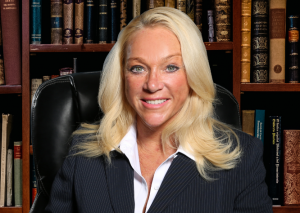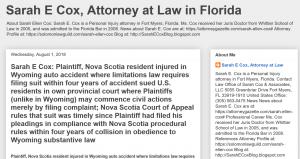Florida Attorney Sarah Cox Announces New Law Instruction Series, first article on Business & Real Estate Law
Sarah E. Cox is publishing series of instructional articles, all of which will be published on her Blog. First article on Business & Real Estate completed
Law Office of Sarah Cox & Associates, LLC (N/A:N/A)
"U. K. Privy Counsel reviews judgment of Bahamas Court of Appeal and disapproves failure of Florida bankruptcy judge to observe international comity"
Attorney Sarah Cox summarizes the case as follows. This unnecessarily complicated case before the Privy Council deals with a sale of Bahamas real property under a court order. The property in question is a one story residence on a plot of land known as Lot 32, North Cat Cay. Though in a desirable location, the house is in a poor state of repair and seems to have been empty for long periods.
Part of the difficulty is that although the litigation has so far produced seven orders (some interlocutory and some final) made by Bahamas first instance Judge Lyons, it was only at the hearing leading up to Order (6) that the judge heard oral evidence from deponents followed by cross examination.
Another complication has been the concurrent Florida bankruptcy litigation involving Mr. James F. Walker, one of the Petitioners, initially with questionable regard to the principles of international comity.
The first 5 orders include Order (1) of September 3, 2002 for the sale of Lot 32 (then owned by the bankrupt and his wife) to Susan Lundborg (Respondent); Order (2) of July 7, 2003 that the parties complete the sale within 14 days; Order (3) of July 21, 2003 (not in the record) embodying an undertaking that Respondent would not proceed pending an application for a stay of the order for sale made by Mr. Walker’s Florida trustee in bankruptcy; Order (4) of March 23, 2004 allowing Respondent’s intervention and rejecting the trustee’s application for a stay; and Order (5) dated July 26, 2004 and applied for by Mrs. Walker which stayed the order for sale until the court could resolve the disputed issues by cross examining the deponents.
Two more orders need consideration: Order (6) of December 7, 2004 (after the lower court had heard some oral evidence) setting aside the order for sale; and Order (7) dated February 28, 2005 setting aside a money judgment which a bankruptcy Plaintiff, Eleanor C. Cole, had obtained against Mr. Walker in the Supreme Court of the Bahamas on December 3, 1996, which purported to enforce an earlier Florida judgment against the bankrupt.
The Petitioners’ appeal to the Judicial Board of the Privy Council is from a November 15, 2005 order of the Bahamas’ Court of Appeal It set aside Orders (6) and (7). The Board has to resolve the appeal based on the points at issue, and, incomplete as they are, on Judge Lyons findings of fact.
Attorney Sarah E. Cox explains. Plaintiff, the Petitioners and the Respondent are all U.S. citizens living in Florida. The Petitioners, however, at one time did reside in the Bahamas. In 1983, they bought Lot 32 as joint tenants. They immediately mortgaged it back to the previous owners and have since paid off that mortgage.
In October 1990, Plaintiff sued Mr. Walker in the Bahamas’ court to enforce a November 1989 Florida judgment for about $300,000 which she had gotten against him. Mr. Walker had entered an unconditional appearance and the court had given summary judgment against him in April 1991. A month later, however, he got an order setting aside the judgment on the ground that he was challenging the original Florida judgment. Five years went by but the Florida judgment technically remained in effect. On December 3, 1996, Plaintiff again obtained summary judgment in her enforcement proceedings in the Bahamas.
Mr. Walker’s bankruptcy in Florida had a great influence on the U.S. parties’ conduct in the Bahamas litigation. In retrospect, it had only a marginal relevance to the issues that the Board has to decide. Nor has the Board heard any argument about any issues of private international law.
“In the Bahamas, there are no statutory provisions for cross border assistance in insolvency with an international element involving the U.S. Under general principles of private international law, one country will usually recognise the status of a trustee in bankruptcy (or similar officer) appointed by another country, and will also recognise his title to moveable (but not to immoveable) property situated in the recognising country.”
“Mr. Walker’s interest constituted immoveable property. Even if, under Florida bankruptcy law, Mr. Walker’s world wide estate, moveable and immoveable, vested in his bankruptcy trustee, courts in the Bahamas would not recognise the trustee’s title to immoveable property within its jurisdiction.” [¶ 25]
On January 10, 2003 a Florida bankruptcy judge (FBJ) appointed Linda Walden as receiver for Plaintiff to get hold of Mr. Walker’s assets. During February, the FBJ subpoenaed Respondent to produce documents for the purposes of the receivership. On April 25, 2003, Mr. Walker (through his Florida attorney, Rotella) filed for Chapter 7 bankruptcy.
The FBJ discharged Mr. Walker from bankruptcy on September 21, 2005. On November 20, 2007, there was a further order setting aside the original Florida judgment of November 14, 1989.
Shortly before this, Turnquest had obtained Order (2) of July 7, 2003. This order raised a number of puzzling questions. It still listed Turnquest as appearing on behalf of Plaintiff although the relief he applied for was contrary to her instructions. Petitioners knew nothing about it either.
On or about July 11, 2003, Respondent deposited $402,000 with the Callenders firm. According to Turnquest’s evidence to the FBJ on May 5, 2004, the above sum about equaled the full purchase price. Turnquest deducted about $44,000 for professional fees due to him from Plaintiff – but without telling her. He ceased to act for her on July 21, 2003. Mr. Knox, QC for Petitioners, told the Board that the balance of the $402,000 has since been repaid to Respondent.
The Florida bankruptcy now began to directly impact the Bahamas litigation. Ms. Walden, the then trustee, faxed the nullifying declaratory order to Judge Lyons on July 17, 2003. Ms. Walden arrived in Nassau soon after. She hoped to have the local court vacate the Lot 32 sale order. On July 21, 2003, there was a hearing before Judge Lyons attended by Turnquest (for Respondent), Moxey (for the trustee), Collie (for the Petitioners) and Ms. Gwynn and another Florida attorney (for Plaintiff).
Sarah Cox explains that only Petitioners and Collie have been cross examined on their affidavits in these proceedings. On March 23, 2004, Judge Lyons heard the applications by Ms. Walden and Respondent together, Order (4). Turnquest, Moxey and Collie were present. Judge Lyons gave a short judgment which suggests that he was still annoyed about the FBJ having purported to nullify his sale order. He concluded that there was “absolutely no doubt in my mind that there is a binding contract for purchase/sale between Respondent and Petitioners.”
On April 27, 2004, Plaintiff made an affidavit in the bankruptcy proceedings averring that she had never met Saunders and had never given him authority to make his affidavit dated September 3, 2002. She also made an affidavit sworn on June 15, 2004 in the Board’s proceedings. It deposed that Turnquest had been acting contrary to Plaintiff’s instructions when the first and second orders were made.
In June of 2004, Mrs. Walker, acting through new attorneys, Lockhart & Munroe of Nassau, applied for an order staying the sale to Respondent under Orders (1) and (2) on the grounds (1) that the attorneys’ representations to the court on her behalf lacked her knowledge or authority; (2) that the orders had first come to her attention long after they were made; and (3) that Respondent’s offer was far below the true value of the property. She added that she would rely on affidavits by herself, her husband and Rotella. There were also affidavits from Collie, Miss Cole, and the local appraiser, a Mr. Lowe of HG Christie Real Estate.
Mr. Lowe valued Lot 32 at $950,000 as of June 16, 2004, with a retrospective valuation of $640,000 as of September 3, 2002. Mrs. Walker made her application eleven months after she had learned the full facts and just under three months after the rejection of the trustee in bankruptcy’s application.
Finally, on February 28, 2005, Judge Lyons set aside Order (7) dated December 3, 1996 made in the proceedings 1355 of 1990. The judge based his decision on the fact that Mr. Walker was not a resident in the Bahamas at the time of service but Plaintiff had not obtained leave to serve him out of the jurisdiction.
At the hearing on Order (6), Mr. Lockhart’s skeleton arguments relied on two main points: first, that Plaintiff had no cause of action against Mrs. Walker, since the charging order did not bind her share; and second, that Mr. Collie had no authority, actual or ostensible, to agree or consent to the sale order on behalf of Mrs. Walker.
“Once the Court of Appeal recognised that the transaction was essentially a judicial sale, albeit under a consent order, the crucial questions were whether a mistake had been made, and whether (as a matter of discretion) the mistake should be put right. An attorney’s consent given with ostensible but not actual authority would still be a mistaken consent, although one which the court would be less ready to correct at the expense of third party rights.”
“The failure of Petitioners to appeal Orders (1) and (2) was excusable, since (as the judge found) they knew nothing about them until long after the time for appealing had expired. In any event, it is doubtful whether an appeal against those orders would have been more appropriate than the course that Mrs. Walker eventually took. Order (4) is more problematical, because by then Petitioners did know the facts but were still apparently represented ... by Collie.”
“The judge considered the issue of delay but his analysis was flawed because he concentrated on Mr. Walker. Moreover, he did not pay sufficient regard to the prejudice to [Respondent]. He misdirected himself in exercising his discretion. In their Lordships’ opinion, Mrs. Walker, as a litigant asking for an extraordinary exercise of discretion in her favour, failed to act sufficiently promptly and failed to provide the court with a full and frank explanation of her delay. On those grounds the judge should have declined to make [Order (6)] and the Court of Appeal were right to set it aside (although their Lordships do not concur in all the Court of Appeal’s reasons).” The Court of Appeal was also right, for the reasons which it gave, in setting aside the seventh order.
“The judicial sale to [Respondent ] has still to be completed. Even at this late stage it may be appropriate for a wholly independent attorney to be appointed to have conduct of the sale and see it through to completion. That course may be particularly desirable if there is to be yet more litigation as to the effect on the charging order of the Florida orders of April 12, 2005 and November 29, 2007. Their Lordships express no opinion whatever on that matter. For these reasons, their Lordships will humbly advise Her Majesty that both appeals should be dismissed.” [¶¶ 41 80].
The case is Walker v. Lundborg, 2008 WL 576820 (Privy Council No. 79). The article will be published in full on the Blog of Sarah Cox at https://SarahECoxBlog.blogspot.com
About Sarah E. Cox
Sarah E. Cox is a Personal Injury & Real Estate Attorney in Fort Myers, Florida.
Contact
Law Office of Sarah Cox & Associates, LLC
5055 Greenbriar Drive
Fort Myers, FL 33919-1910
United States
Office: (305) 563-0475
sarahellencox@gmail.com
Ms. Cox received her Juris Doctor from Whittier School of Law in 2005, and was admitted to the Florida Bar in 2008.
Before law school, Ms. Cox attended Edison Community College (now Florida Southwestern State College), and University of South Florida, and received her Bachelor’s Degree in Psychology in 1997 (Magna Cum Laude, Phi Beta Kappa Honors).
Ms. Cox interned at the Ruth Cooper Center Drug Abuse Treatment and Education in Fort Myers, where she worked with mentally handicapped individuals and lead group meetings.
References
Attorney Profile at: https://solomonlawguild.com/sarah-ellen-cox
Blog at: https://SarahECoxBlog.blogspot.com
Sarah E. Cox
Law Office of Sarah Cox & Associates, LLC
(305) 563-0475
email us here
PBS Newshour, Are investors pumping up another housing bubble in Florida?
Legal Disclaimer:
EIN Presswire provides this news content "as is" without warranty of any kind. We do not accept any responsibility or liability for the accuracy, content, images, videos, licenses, completeness, legality, or reliability of the information contained in this article. If you have any complaints or copyright issues related to this article, kindly contact the author above.





